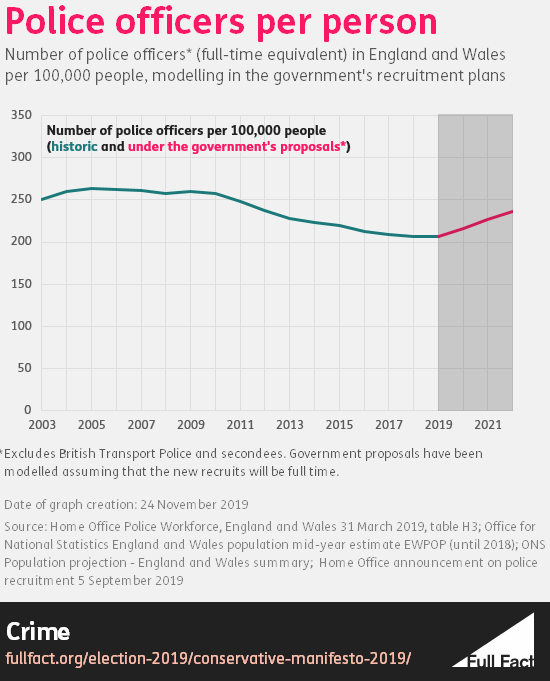Economic inactivity figures explained
The government has been reacting to the publication of new data on employment and wages.
Posts shared on X by the Department for Work and Pensions, and its secretary of state Mel Stride MP, claim that the figures show economic inactivity is down by “almost 300,000 since its pandemic peak”.
That seems to be broadly correct, based on adjusted experimental economic inactivity statistics published by the Office for National Statistics. These show that in the three-month period from July to September 2023, there were 8,726,000 economically inactive people aged 16-64—that’s 285,000 fewer than in the three-month period between May and July 2022, when economic inactivity peaked at 9,011,000 (though these figures have not been adjusted).
The rate of economic inactivity has remained constant at 20.9% since the three-month period between April to June 2023, though the number of economically inactive people has increased slightly over this period.
Honesty in public debate matters
You can help us take action – and get our regular free email
Subscribe to weekly email newsletters from Full Fact for updates on politics, immigration, health and more. Our fact checks are free to read but not to produce, so you will also get occasional emails about fundraising and other ways you can help. You can unsubscribe at any time. For more information about how we use your data see our Privacy Policy.
Has the UK doubled aid to Palestinian civilians?
In recent weeks, the government has said that it has “doubled” aid for Palestinian civilians—a claim also referenced by Rishi Sunak following the King’s Speech last week.
It is true that recently announced aid for the Occupied Palestinian Territories (OPTs) doubles the total amount in aid commitments for the OPTs this year. But that comes after a substantial fall in aid commitments in recent years. We’ve looked at the numbers here.
Fact checking David Cameron
While the Cabinet reshuffle is ongoing, there’s no doubting the big political story of the day—the return to government of former Prime Minister David Cameron, as the new foreign secretary (and the newest member of the House of Lords).
Full Fact was a different organisation back in 2016 when Mr Cameron was last in Downing Street, and our website is a different beast too, so unfortunately there’s no easy way to review all the times we’ve fact checked the former PM. (Though we do have a handy tool to check if we’ve fact checked any currently sitting MP.)
But a quick review of our archive shows we fact checked claims by Mr Cameron dozens of times between 2010 and 2016, on everything from the budget deficit and police numbers to school spending and female employment figures. And just days before the 2016 EU referendum, we live fact checked Mr Cameron’s BBC Question Time special.
In March 2016, after we fact checked a claim Mr Cameron made at Prime Minister’s Questions about school capacity, he subsequently corrected the Parliamentary record.
Full Fact continues to monitor Prime Minister’s Questions, which returns this week, and to seek corrections if the PM or any other MP makes a false claim.
Fact checking claims about protests in the capital
Given there’s a fair bit of news coming out of Westminster today, the weekend may feel a long time ago now. But the big political story on Saturday and Sunday was of course protest marches in London. And on Friday we published two relevant fact checks.
The Conservative MP Danny Kruger told the Today programme last week that a poll showed by “two to one” the public feel police are “too soft” on pro-Palestinian protesters. We tracked down the YouGov poll in question and found that doesn’t fully explain what it found.
We also spent Friday afternoon investigating a viral audio clip which was supposedly a recording of London Mayor Sadiq Khan calling for Remembrance weekend events to be postponed. We found no evidence that it was genuine—the Mayor’s office told us it was fake and the police were investigating. Since then Sky News has reported that specialist officers have reviewed the clip “featuring artificial audio” and “assessed that it does not constitute a criminal offence”.
Welcome to Full Fact’s politics live blog
Hello, and welcome to Full Fact’s parliamentary and politics live blog.
We’re launching this blog a few days into the 2023-24 parliamentary session, likely to be the final session before the next general election.
We’ll be using this page to provide updates on our politics coverage. That means you’ll see quick reactive fact checks on the day’s political agenda but also links to our more in-depth political fact checks, and our wider work dealing with online misinformation and campaigning for better information in the run-up to the election.
Plus we’ll be giving a bit of an insight into the fact checking process, telling you about some of the claims we’re looking into and some of the (quite extensive) research that goes on behind the scenes.
This is a trial, so please do let us know what you think and how we can improve. You can find out how to get in touch with the Full Fact team here.
Rounding off the election campaign
Today we’ve published our final roundups of the election campaign.
You can now see all our key fact checks from the Conservatives, Labour, the Liberal Democrats and SNP, and Plaid Cymru, the Green Party and the Brexit Party.
Also after nearly 500 of you sent us your questions, we’ve answered some of them as part of Ask Full Fact.
And if you’re planning to vote tomorrow, here’s our guide to what you need to know about polling day.
These are the facts that we know about the photo of the boy in Leeds General Infirmary
A photo of a boy lying on the floor of Leeds General Infirmary has become one of the most contentious stories of the election campaign.
Here’s what we know about the photo. We will continue to update this when we learn more.
The story first appeared in the Yorkshire Evening Post. The reporter who broke the story, Daniel Sheridan, has said on Twitter that he waited for the hospital to confirm the incident.
Sarah Williment told the publication that her son, Jack, had been taken to hospital on December 3rd with suspected pneumonia. Jack was moved from a bed due to an emergency arrival and put in a room without a bed. Jack, wanting to sleep, had to use the floor. He stayed overnight, but according to Mrs Williment, it took him 13 hours after arrival to be given a bed on a ward.
The article also included a statement from the Dr Yvette Oade, the Chief Medical Officer of the hospital’s NHS trust, apologising for what happened and confirming key aspects of the story.
That statement says, in part: “Within four hours a decision was made to admit Jack to our Children’s Assessment and Treatment (CAT) Unit for further monitoring overnight. Unfortunately, the unit was also experiencing exceptionally high levels of demand which meant that Jack was required to wait in the clinical treatment room in the Paediatric Emergency Department until a bed became available. Jack was admitted to the CAT Unit later that evening and was discharged home the following morning after a medical review.
“We are extremely sorry that there were only chairs available in the treatment room, and no bed. This falls below our usual high standards, and for this, we would like to sincerely apologise to Jack and his family.”
Health Secretary Matt Hancock also issued an apology after visiting the hospital.
Following the story receiving national coverage, a number of people on social media claimed to have information that countered the mother’s story.
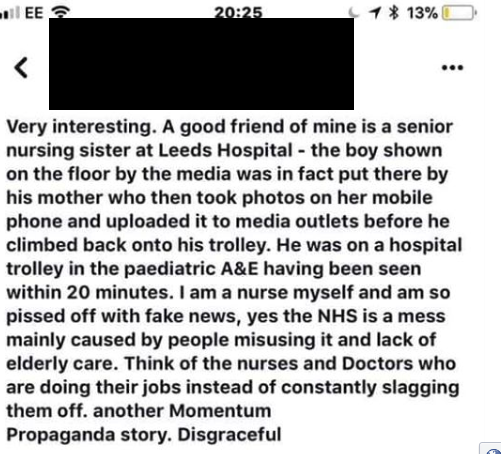
A post on one woman’s Facebook page claimed that she knew a nurse at the hospital, who supposedly said that the boy actually had a trolley and was placed on the floor by his mother for the purpose of the photo (a claim that seems to be contradicted by the statement from Dr Oade). This account of the incident was copied and pasted by numerous other people and quickly spread across social media, making it look as though many people were claiming to know the situation.
The woman has since told the Guardian that her account was hacked and that she knows nothing about the situation.
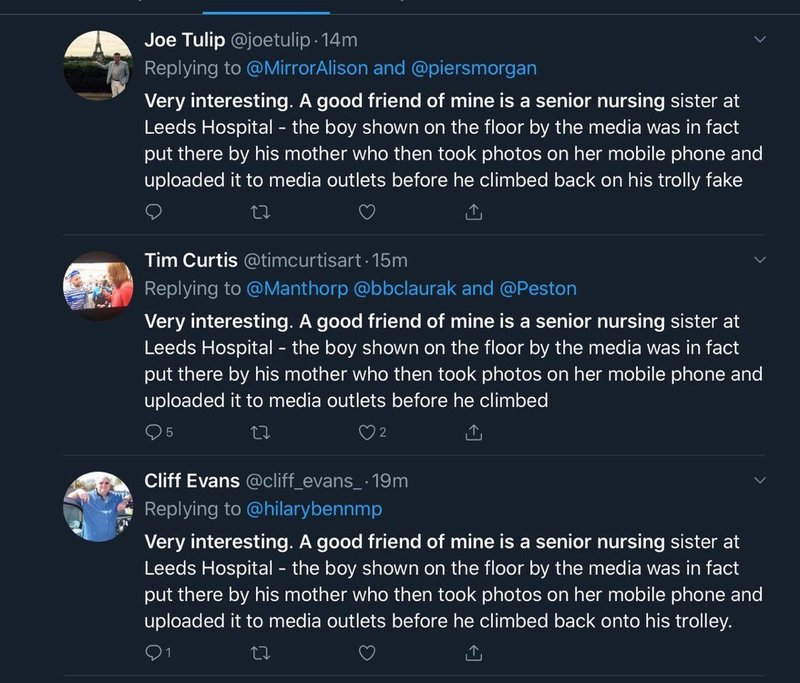
Many social media users have suggested that these accounts are 'bots', but we have seen no evidence to date that they are automated. As we've written before, what can appear to be bot-like behaviour is often carried out by real humans.
There has been some confusion as to whether a hospital trolley bed can be seen in the photo (which shows an item of furniture with wheels in the upper right corner). There's no reason to believe that this is a trolley bed; a lot of hospital equipment has wheels so it can be moved to where it is most needed. The equipment in the photo also appears to have shelves, suggesting it is unlikely to be a trolley bed.
Honesty in public debate matters
You can help us take action – and get our regular free email
Subscribe to weekly email newsletters from Full Fact for updates on politics, immigration, health and more. Our fact checks are free to read but not to produce, so you will also get occasional emails about fundraising and other ways you can help. You can unsubscribe at any time. For more information about how we use your data see our Privacy Policy.
The punch that never was
Earlier today many senior political journalists reported that a Labour activist punched an aide to Conservative Health Secretary Matt Hancock while he was visiting a hospital in Leeds.
This did not happen.
Video footage shows Mr Hancock’s aide walking into the outstretched arm of a man who had previously been shouting at Mr Hancock.
Mr Hancock was visiting Leeds General Infirmary after the Yorkshire Evening Post (and subsequently the Daily Mirror) published images of a four year-old boy with suspected pneumonia sleeping on the floor of the hospital because of a lack of bed space.
(The boy turned out not to have pneumonia, as the YEP story makes clear; an earlier version of this post left out the word "suspected".)
9 December 2019, 1.43pm (updated)
Are there more food banks than McDonald's restaurants in the UK?
There’s a claim circling today that there are more food banks in the UK than McDonald’s restaurants. Based on the figures we’ve seen, it is accurate.
There are approximately 1300 McDonald’s restaurants in the UK, according to the company.
A recent report by the House Of Commons Library found that there are at least 2000 food banks in the UK. This figure is an underestimate, as it primarily comes from the Trussell Trust and the Independent Food Aid Network, and does not include every type of food bank, such as food banks operating in schools.
One of the Twitter posts also attempted to show food bank growth. According to the figures in one report from the Trussell Trust, the tweet underestimates food bank numbers in 2011 at least, and again, it’s likely there are non-Trussell food banks not accounted for.
Related topics
McDonald'sAnswering listeners' questions on talkRADIO
Our Chief Executive, Will Moy, spoke to Alexis Conran on talkRADIO this lunchtime talking about our latest fact checks this election.
One listener wanted to know about claims on tree planting this election. We’ve previously put Labour’s policy to plant two billion new trees by 2040 into context. In short: it’s not an unprecedented task to plant enough trees per day, and perhaps the bigger question is where they would be planted. As a very rough estimate, Labour’s plan would cover around 5% of current UK land.
We were also asked about whether EU rules would stop the UK for nationalising utilities. We haven’t looked at this question in detail, but legal commentator David Allen Green has argued that EU rules don’t prohibit this. At the same time, rules on regulation could restrict what practical changes can be made, and human rights laws (importantly, not from the EU) could require companies affected to be adequately compensated.
We covered several claims from our fact check of the BBC’s debate between Jeremy Corbyn and Boris Johnson on Friday, including whether the UK is the world’s 5th richest country (it’s the 6th or the 9th largest in terms of GDP) and whether the EU is stopping the UK from having “free ports” (it isn’t).
We also talked about how much the NHS is spending on private providers. This has been rising historically but if anything has stayed flat in recent years.
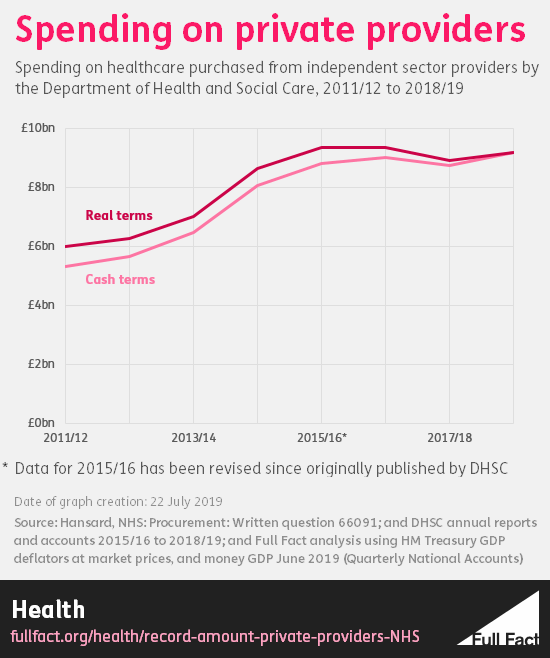
Child poverty claims also came up, and we confirmed that, according to the main measures of poverty, about four million children in the UK live in relative low income, and that figure could rise to about 4.6 million if you factor in other costs people face too, according to the independent Social Metrics Commission.
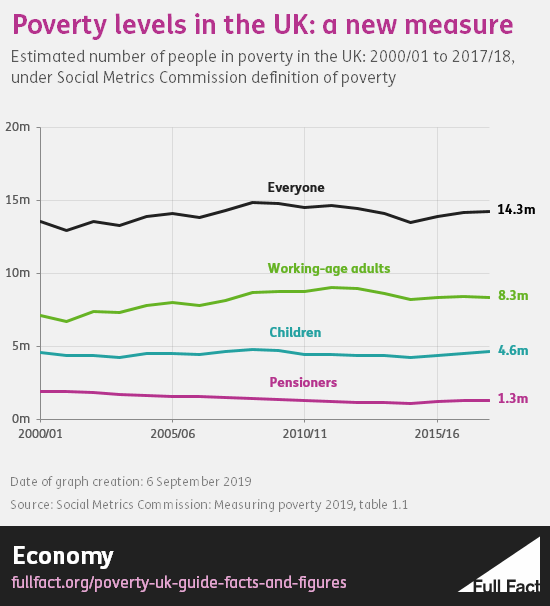
And on police officers, the Conservatives’ pledge to increase officer numbers by 20,000 would almost offset the fall in officers in England and Wales since 2010, but won’t bring numbers per person back to its recent peak in the mid-2000s.
